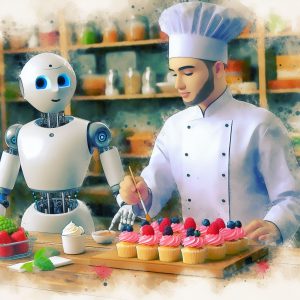In the bustling environment of a restaurant kitchen, line cooks play a pivotal role in orchestrating culinary masterpieces that delight diners. However, the relentless demands of this fast-paced environment can often lead to burnout, high turnover rates, and challenges in maintaining consistency. Enter AI-powered cooking assistants, poised to revolutionize restaurant kitchens and redefine the culinary landscape.
1. Enhanced Efficiency and Productivity:
AI-powered cooking assistants bring a new level of efficiency to kitchen operations. By automating repetitive tasks such as recipe management, order tracking, and ingredient preparation, these assistants free up line cooks to focus on more creative aspects of cooking. This leads to increased productivity, reduced errors, and faster turnaround times, allowing restaurants to serve more customers with greater accuracy and speed.
2. Improved Consistency and Quality:
Consistency is paramount in the food service industry. AI-powered cooking assistants ensure that dishes are prepared according to standardized recipes, maintaining a consistent taste and quality that customers have come to expect. By providing real-time feedback and guidance, these assistants minimize the risk of human error, leading to a more uniform and satisfying dining experience.
3. Increased Culinary Creativity and Innovation:
AI-powered cooking assistants act as culinary companions, inspiring line cooks to explore new recipes, experiment with flavors, and push the boundaries of creativity. These assistants can analyze customer preferences, culinary trends, and ingredient availability to generate innovative menu items that appeal to a diverse range of diners. This not only enhances the restaurant’s reputation but also keeps customers engaged and excited to return for new culinary adventures.
4. Up-Skilling and Retention of Line Cooks:
The introduction of AI-powered cooking assistants provides line cooks with an opportunity to up-skill and expand their culinary repertoire. By working alongside these assistants, line cooks learn new cooking techniques, broaden their knowledge of ingredients, and gain a deeper understanding of the science behind cooking. This continuous learning fosters a sense of growth and satisfaction, contributing to higher job retention rates and a more stable workforce.
5. Data-Driven Decision Making:
AI-powered cooking assistants generate valuable data that can be harnessed to make informed decisions about menu planning, inventory management, and resource allocation. This data provides insights into customer preferences, popular dishes, and ingredient usage patterns, enabling restaurant owners and chefs to optimize their operations, reduce waste, and maximize profitability.
Challenges and the Road Ahead:
Despite the immense potential of AI-powered cooking assistants, there are challenges that need to be addressed for their seamless integration into restaurant kitchens. These include the initial cost of implementation, the need for extensive training for line cooks, and the potential for job displacement. It is crucial for restaurant owners and operators to approach the adoption of AI technology with a forward-thinking mindset, investing in comprehensive training programs and ensuring that line cooks view these assistants as valuable tools rather than replacements.
Conclusion:
AI-powered cooking assistants are poised to transform restaurant kitchens, empowering line cooks with increased efficiency, consistency, creativity, and data-driven decision-making. As this technology continues to advance, it will play a pivotal role in shaping the future of the culinary industry, enhancing the dining experience for customers and fostering a more sustainable and innovative restaurant ecosystem.
Title: Navigating the Evolving Landscape of Line Cook Jobs in the Food Industry
Introduction:
The food industry is undergoing a transformative journey, driven by advancements in technology and the increasing automation of tasks. The role of line cooks, who play a pivotal role in the preparation of meals in restaurants and foodservice establishments, is being reshaped by these changes. This blog explores the potential dangers associated with line cook jobs, the possibilities of their replacement by artificial intelligence (AI), the ways in which AI can assist line cooks, and strategies for adapting to the changing landscape.
-
Dangers of Line Cook Jobs:
a. Physical Hazards: Line cooks work in fast-paced, often high-pressure environments, which can lead to increased risk of accidents. They may be exposed to sharp knives, hot surfaces, steam, and grease, potentially causing cuts, burns, and other injuries.
b. Repetitive Motion Injuries: Line cooks perform repetitive tasks, such as chopping, slicing, stirring, and sautéing, which can contribute to muscle strain, joint pain, and other health issues over time.
c. Mental and Emotional Stress: The high-stress nature of line cook jobs, combined with long hours and irregular shifts, can impact mental health and general wellbeing. -
Possibilities of Job Replacement by AI:
a. Automation of Tasks: AI-powered kitchen machines, such as robotic arms and automated food preparation systems, are becoming increasingly advanced. These technologies can perform routine tasks currently undertaken by line cooks, like chopping, weighing, and assembling dishes.
b. Algorithmic Cooking: AI-driven algorithms can analyze data related to food preferences, nutritional needs, and kitchen inventory to generate optimized cooking recipes and menus. -
How AI Can Help Line Cooks:
a. Reducing Hazards: AI-powered systems can monitor kitchens for potential hazards, such as fire risks or unsanitary conditions, and alert cooks to take appropriate action.
b. Improved Efficiency: AI-enabled kitchen management systems can help line cooks optimize their workflow by coordinating tasks, keeping track of orders, and managing inventory.
c. Personalized Recommendations: AI algorithms can analyze customer data to generate personalized food recommendations, aiding line cooks in catering to specific dietary requirements and preferences. -
Adapting to the Changing Landscape:
a. Upskill and Reskill: Line cooks can enhance their skills in areas such as culinary techniques, food safety, and kitchen management to remain relevant in the face of automation.
b. Seek New Opportunities: With the potential shift in job dynamics, line cooks may explore opportunities in related fields, such as food science, restaurant management, or catering, where their culinary expertise can be utilized.
c. Advance Technological Knowledge: Acquiring knowledge about AI-powered kitchen technologies and learning to operate them efficiently can open up new avenues for career growth.
Conclusion:
The evolving landscape of line cook jobs in the food industry presents both challenges and opportunities. While AI has the potential to automate certain tasks, it can also enhance efficiency and safety in the kitchen. To thrive in this changing landscape, line cooks must embrace new technologies, upskill and reskill, and explore alternative career paths. Adapting to the dynamic environment and leveraging AI’s capabilities will allow line cooks to remain valuable contributors in the ever-evolving food industry.



